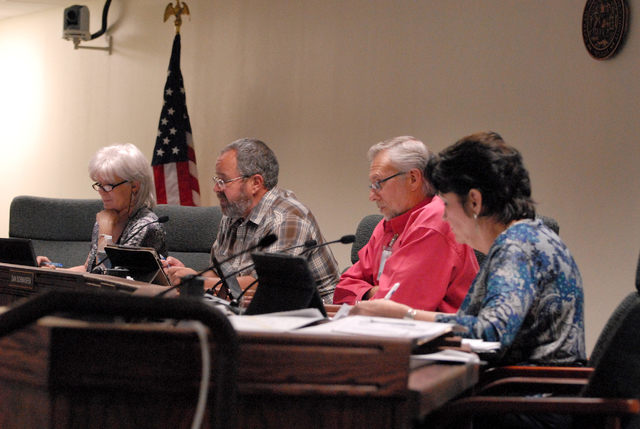
TONOPAH — A bill proposing to list the 3 percent annual increase on property taxes was the top priority of Nye County commissioners Tuesday for submission to the 2015 session of the Nevada Legislature.
Nye County is only allowed one bill draft request, but commission Chairman Dan Schinhofen suggested three BDRs be listed in order of priority. The 2015 session of the Nevada Legislature begins in February.
County Commissioner Lorinda Wichman emphasized the bill would only impact properties that were sold. Wichman is the incoming president of the Nevada Association of Counties. She said the legislation limiting residential tax increases to 3 percent annually has hurt Nye County’s recovery from the recession where appraised values have been increasing.
“When a piece of property is sold, the market has established a new value to that property and that’s when that cap needs to be adjusted,” Wichman said. “We lost $4.5 million the year before last and last year we lost $9 million.”
That $9 million in lost taxes comprised a third of the entire county budget, Wichman said. The state Legislature has a task force currently working on the property tax structure, she said.
Commissioner Butch Borasky suggested the second priority should be a bill raising the threshold to $250,000 on which counties have to pay prevailing wages for public works projects. He suggested a bill requesting a share of diesel tax money be the third priority.
Schinhofen said he’d like to see a bill exempting counties under 100,000 population from collective bargaining requirements with unions, but said Assemblyman James Oscarson, R-Pahrump advised him it wouldn’t make it out of committee.
Commissioner Donna Cox read a letter from Nye County Republican Central Committee Chairman Bill Carns in support of the collective bargaining bill.
“For the state to be exempt from the requirement but for all smaller governments within the state to be mandated to enter into public employees union negotiations has had horrible long-term financial implications here in Nye County and throughout the state,” Carns wrote.
He said Nye County could rally support from the other 14 rural counties to push the legislation, which would draw attention to the matter which has strangled Nevadans in difficult financial times.
Commissioners previously discussed using their sole bill draft request to allow the public administrator to receive a paid salary. Schinhofen said Oscarson is planning to introduce a bill addressing the public administrator’s office.
Wichman questioned where the county would come up with the money to pay a salary.
Wichman wanted to amend the definition of perjury of intentional, untruthful testimony. Presently speakers before the Nevada legislature have a plaque in front of them that advises any false statements made to the Legislature constitutes perjury, she wanted to extend that penalty to county meetings. Wichman said Assemblyman James Settlemeyer, R-Minden, may carry that bill.
“The suggestion was to expand on the definition of perjury so that it included testimonies that were given before the board of commissioners or planning commission, county government,” she said.
Many times decisions are made based on testimony to county commissioners that later turn out to be incorrect, Wichman said.
Schinhofen had suggested a better share of Railroad Valley oil royalties, which was submitted in numerous sessions without success. State law allocates the first $7 million of the money received from the lease of federal lands to the State Distributive School Account.
After the first $7 million, 25 percent goes to the Distributive School Account, the remaining 75 percent goes to the counties, of which the county must give one-fourth of their portion to the school district.
Schinhofen mentioned he’s been approached by people who want to continue growing their own marijuana, which won’t be allowed when medical marijuana cultivation and dispensary facilities are permitted.
The state Advisory Commission on the Administration of Justice’s Subcommittee on the Medical Use of Marijuana discussed whether to extend the sunsetting of regulations allowing home growing of medical marijuana at a meeting Aug. 21.